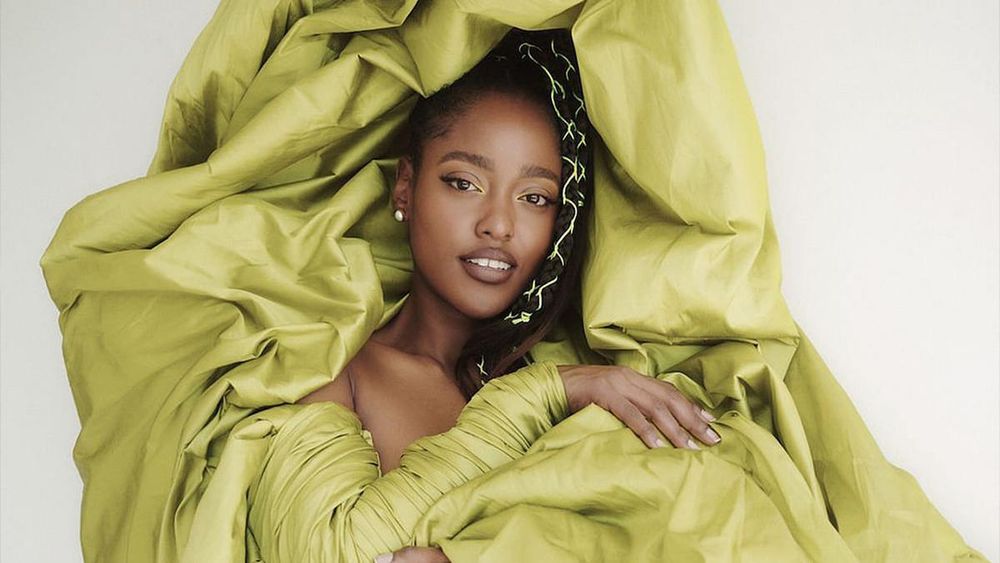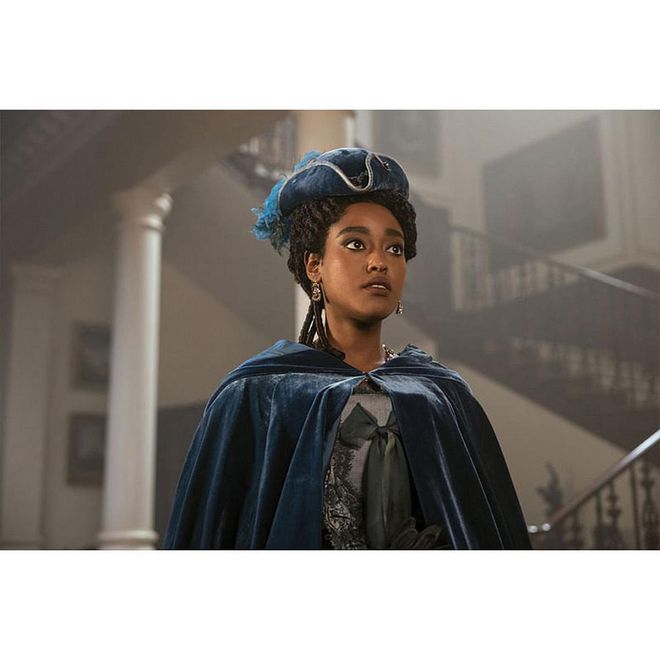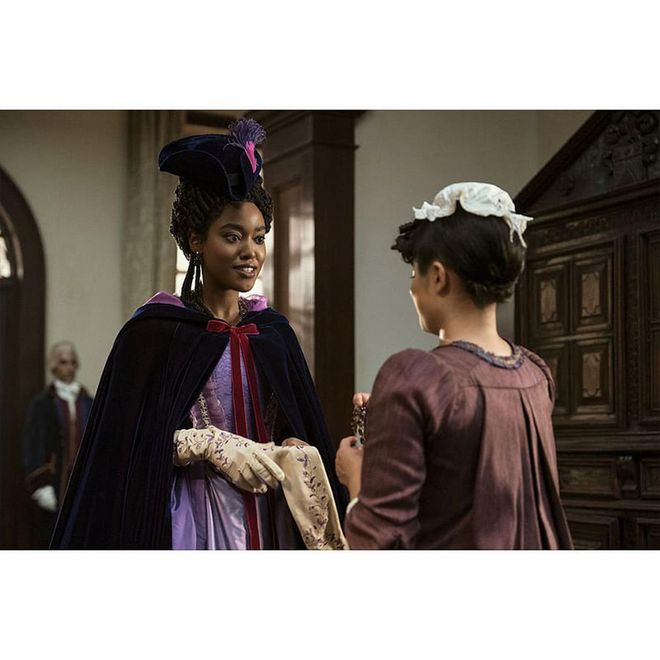How Arsema Thomas Brought Young Lady Danbury To Life In 'Queen Charlotte'
"She's the type of character that I love playing. She's the type of woman that I look up to," the breakout star of Queen Charlotte tells Bazaar.

Arsema Thomas didn’t know that she would end up playing Agatha Danbury, let alone that she would become the breakout star of Queen Charlotte: A Bridgerton Story.
Taking place forty years before the events of the Netflix hit Bridgerton, the prequel tells the story of a young Queen Charlotte and King George as they fall in love and transform England, particularly when it comes to race relations. That change ushered in a new wave of Lords and Ladies, including Agatha Danbury, who we spend almost as much time with as we do with the young Queen Charlotte (India Amarteifio) as she joins the royal court and fights for her spot amongst society.
Every time Thomas shows up on the screen, she quickly steals the show. Of course, part of that is her character—a bold young woman entrapped in a loveless marriage who is eager to be a part of high society and create less racial tension—but just as much of Agatha’s charm and wit seems to be Thomas’ doing.
“She's in such a different place to where she is in Bridgerton so it meant that she could be different,” the 28-year-old actress tells Bazaar.com. “It's natural and normal for her to be different from her counterpart all those years later.” While she spent time talking with Adjoa Andoh – the actress who portrays the older Lady Danbury – to discuss through lines for Agatha, she also drew from her life to create the younger version of the character.
Below, Thomas spoke about what first interested her in acting, her inspirations for Lady Agatha, and what working alongside the rest of the cast, especially Amarteifo and Andoh, taught her.
Related article: What ‘Bridgerton’ Gets Right About Queen Charlotte, A Real-Life Royal
When did you know you wanted to be an actress?
As a kid, I did this play at an after-school program. I remember I played the zebra and there was something exhilarating about telling a story that was not my story and not true. My parents never came to watch it, [chuckles] but there was something about it that made me feel so proud. I knew that I wanted to be an actor, but I didn't know that I could be one.
Were your parents supportive or did it take a moment?
When I told my parents they were in shock but slowly came around. They're proof of concept people; they want to make sure what they’re investing in has legs and this is an industry that they have no idea about so they were scared for a bit that I would be on my own in this very big and very intimidating world of entertainment. Every Christmas and New Year, my mom would try and convince me to apply to Ph.D. programs, just in case. At 25, I decided I was going to go for the thing that I wanted, independent of any other influence, and when I took that step I was looking to make sure that I was doing the right thing, that indicator was them being angry or cautious. So it was like, yeah, now I know I'm on the right track.
What drew you to the role of Lady Agatha?
When I first auditioned, they did not have the role written out. They didn't tell us what we were auditioning for, they just said it was something in the Bridgerton universe, so it was less about what drew me to Agatha and more about what drew me to this kind of storytelling. You have to have a lot of faith in a writer and a production team when you don't have a full understanding of a character and you still want to jump into the story. I think it was because of my previous obsessions with Scandal and How to Get Away with Murder that drew me to Shonda, her type of storytelling, and everything that it represents.

Photo: Netflix
Arsema Thomas
Did they give you a lot of details ahead of time or did they keep it secretive when you found out who you'd be playing?
It was secretive for even longer. When they did tell me, I had not seen the show so I was cool, that sounds fun. Then two weeks before the chemistry read, I watched all of Bridgerton and was floored by who I was playing. You see Agatha in all shapes and sizes in season one, with the younger Duke and as an advisor to all these people, so there was a level of intimidation going in. But then I was like, I would not want to play anybody else but her. She's the type of character that I love playing, she's the type of woman that I look up to, and how amazing it is that there is an intersection between these two things, the aspirational and the career.
You share the screen with a lot of different people, but especially a young Queen Charlotte. What was it like working with India Amarteifio?
From the moment we saw each other at the chemistry read, we've been able to naturally be friends and be caring to each other. I can't speak for her, but for me, there is something so similar between having had a little sister before and her being someone else’s little sister. We kind of slotted into roles that we were familiar with in our personal lives which made it quite nice because then there's that sense of family in your work.
I’ve read that your parents are diplomats and maybe I just don’t know enough about diplomats but that feels like the modern-day equivalent to a “Lady” and “Lord.” Is there any resemblance there? Did it prepare you at all for all the political talk and title talk in the show?
There are definitely potential places of overlap, now that you mention it. Like, why was I so comfortable in a lot of those spaces? I never got to see my parents in action so I don't know what they look like, demanding what they wanted, but I did see them discuss pretty heavy topics at the dinner table. To see the stakes that they fought against and for and with informed a lot of decision-making and behavior of Agatha. You notice the toll that it takes emotionally on her and luckily my parents had each other but Agatha is alone.
Tell me about those first days on set. What was the scariest thing about this role?
The first days on set feel like the first days at a new school. You overpack your bag, everyone's looking at you, everyone knows your name and you don't know anyone else’s, which is quite weird. You see the entire cast and you assume that it's the same people you’re working with every day when in reality, it's different people and it's based on who you have the most scenes with. I realized very quickly in the first couple of days that cast wise, I was going to be pretty much alone. I think one of the difficult things to realize is because of her storyline, and because she is doing so much, it means that she is alone.
Someone she does spend the most time with is Lord Danbury and it’s often taking place during very uncomfortable sex scenes. A lot of people who watched have commented how jarring those were to watch. What was that like to film and why do you think so many of those scenes needed to be shown in the show?
It was the easiest thing to film. I can't remember how many takes we did, maybe two, and then we’d change the clothes and maybe a bedsheet, and then we'd do another two takes and we just keep switching our clothes. I didn't realize how many there were until I watched the whole season. It's such an important thing to show because it does underline the monotony and how entrenched Agatha is in this position. You need to see how many years this has been going on, you need to see just how different she is and how imprisoned she is from the version that we all know and love in Bridgerton. It was one of the moments where I started to differ from Agatha because she takes a lot. She truly has no say in this entire situation and the only way to show that is to show her in a position where her pleasure is not prioritized and the most dutiful thing that she could do is to give her body.

Photo: Netflix
Arsema Thomas
Another topic that this series addresses that Bridgerton never did was race. There are so many scenes with the Queen and Augusta where Agatha’s trying to secure her place and secure all the Black family's places in the court. What were those scenes like and how did it feel to work on those scenes?
It was fulfilling to get the backstory and an understanding of how these people can live in this society and do it clearly at a rate that we in this real universe weren't able to do, and still are not able to do. There was something truly powerful about it and it does a really important thing for me in explaining something so nuanced. There is such complexity with race to the point where we're still discussing it now, and to show an alternative universe that is aspirational of how one gets to a society like Bridgerton's London is something that you don't see a lot of in entertainment. We tend to expose and reveal the underbelly of the human experience without any closure or potential solution on how to end the pain and there's something different about showing what could be if we allowed ourselves to let it happen.
Did the older cast, especially Adjoa, give you any helpful advice?
Adjoa was super helpful in putting the confidence in myself to be Lady Danbury. We had a long Zoom call and chatted mostly about our own lives and we plucked the fact that we both have similar foundations for this character. They both have this prioritization around the idea of justice, and that's what Agatha has built a lot of her life around, the difference between right and wrong. To see that reflected in Adjoa's bookshelf with the autobiography of Assata Shakur and a coffee book about art from by Black Panthers, all of these things were nonverbal cues to me that we both have the same ideas of society and that we both injected them into this character.
What other creative mediums are you itching to explore?
I want to get into animation. There's something really special about it when it intersects with heavy topics. Also, I love puppetry and pretty much anything that warps our understanding of reality.
This interview has been condensed and edited for clarity.
This article originally appeared in Harper's BAZAAR US.